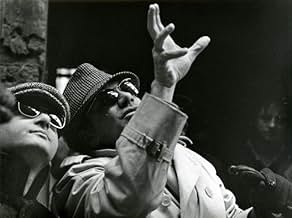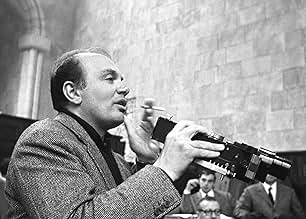AVALIAÇÃO DA IMDb
7,6/10
3,6 mil
SUA AVALIAÇÃO
Adicionar um enredo no seu idiomaPrior to a city council election, the collapse of a building leaves a land developer and his political backers defending themselves against a scandal.Prior to a city council election, the collapse of a building leaves a land developer and his political backers defending themselves against a scandal.Prior to a city council election, the collapse of a building leaves a land developer and his political backers defending themselves against a scandal.
- Direção
- Roteiristas
- Artistas
- Prêmios
- 3 vitórias e 5 indicações no total
Dany París
- Dany - Amante di Maglione
- (as Dany Paris)
Alberto Amato
- Consigliere Comunale
- (não creditado)
Renzo Farinelli
- Giornalista
- (não creditado)
Pasquale Martino
- Capo dell'archivio
- (não creditado)
Mario Perelli
- Capo dell'Ufficio Technico
- (não creditado)
Francesco Rigamonti
- Consigiliere Comunale
- (não creditado)
Renato Terra
- Giornalista
- (não creditado)
Avaliações em destaque
This film seems an effort to engage the life and destiny of a city at the level of the political and social, using journalistic techniques but always with an awareness that these are also interpretations - something that most USian journalism tends to overlook. What will mostly bother people is that it lacks the usual human center - the man/woman/family to which the bad things happen which will cause us to care that they are happening. This is hardly an oversight; it is a choice, and one that deserves to be considered openly without the rush to judgment that otherwise occurs when confronted with the unfamiliar. The human center of the film is there, but always at the edges, implied. We barely glimpse the victims of the collapsed building, but their fate informs every frame. And the superb "portrayals" by actual members of the city council (the De Vita character, e.g.) give us not actors, but people enmeshed in the actuality. This film deserves wider awareness.
Good inquiry movie, talking about the "roaring" '60 when every builder wanted to get richer and richer, basing his success on poor people's needs. It's a constant in Rosi's movies this political touch, but it's not about complaining about one party or the other, but it's more subtly focused on a certain italian laissez-faire in political matters and in social affairs that in some way is still alive today.
Its way of leaving a great space to dialogues and to silent scenes around the city contributes to create a journalistic approach and the witty speeches give the movie an interesting touch.
Well assembled, quite involving, an interesting piece about how power tends to contribute to its power only.
Also an essential view on the 60s and italian postwar society.
Its way of leaving a great space to dialogues and to silent scenes around the city contributes to create a journalistic approach and the witty speeches give the movie an interesting touch.
Well assembled, quite involving, an interesting piece about how power tends to contribute to its power only.
Also an essential view on the 60s and italian postwar society.
Set in 1963 Naples, Hands Over the City is a serious depiction of the corruption, nepotism and social issues of post war reconstruction.
Italy in the early 1960s was barely a developed nation. Like most European participants of World War Two, Italy was left devastated by six years of conflict ending in 1945.
The movie's plot revolves around an investigation of a building collapse resulting in several fatalities. The story plays out in the backdrop of local elections which may affect vested political interests dole out land development contracts to cronies.
By shedding light on back room political dealings, the film exposes the shortcomings of democracy in developing states. Additionally, the raw power of wealth in (literally) buying votes amongst a poor electorate (think India, etc.) is laid bare during the movie.
In such a corrupt environment geared to enhancing the wealth and influence of existing power brokers it is not surprising ordinary people turned to Socialist and even Communist politics. Indeed, Italy's Communist and Socialist parties regularly won 33% or more of the popular vote until the 1980s. (Both parties were independent of policies emanating from Moscow.)
Though one may criticize the movie's pace, the story unfolds well enough to watch. The characters are realistic with the black and white filming adding to the effect of watching a sordid drama unfolding in seedy, smoky backrooms. The cinematography, especially in the opening scenes of Naples cityscape, is excellent. Hands Over the City is a social statement film more than an entertainment piece.
Italy in the early 1960s was barely a developed nation. Like most European participants of World War Two, Italy was left devastated by six years of conflict ending in 1945.
The movie's plot revolves around an investigation of a building collapse resulting in several fatalities. The story plays out in the backdrop of local elections which may affect vested political interests dole out land development contracts to cronies.
By shedding light on back room political dealings, the film exposes the shortcomings of democracy in developing states. Additionally, the raw power of wealth in (literally) buying votes amongst a poor electorate (think India, etc.) is laid bare during the movie.
In such a corrupt environment geared to enhancing the wealth and influence of existing power brokers it is not surprising ordinary people turned to Socialist and even Communist politics. Indeed, Italy's Communist and Socialist parties regularly won 33% or more of the popular vote until the 1980s. (Both parties were independent of policies emanating from Moscow.)
Though one may criticize the movie's pace, the story unfolds well enough to watch. The characters are realistic with the black and white filming adding to the effect of watching a sordid drama unfolding in seedy, smoky backrooms. The cinematography, especially in the opening scenes of Naples cityscape, is excellent. Hands Over the City is a social statement film more than an entertainment piece.
Rod Steiger as a local city politician in an Italian film by Francesco Rosi makes a virtuoso performance as usual in his younger days and is convincing enough in fluent Italian in one of Francesco Rosi's usual almost documentary panoramic exposures of social life especially in relation with power. Everything appears absolutely natural here, as if you were yourself present at all those turbulernt political meetings with votations and intrigues around the mayor, and the crisis is brought on by a collapsing building of many storeys and flats owned by local leaders of the city government, who choose to fight it out against allegations of corruption, and the council scenes with dramatic quarrels Italian style pounding on in heated passion are the best of the film. It happens in Naples, but the situation could be anywhere in any great city in the world planning to exploit and make money on new suburb constructions of horrible inhuman skyscrapers all looking the same - with new prospects of coming tumbling down.
In the early sixties Vittorio de Sica and Dino Risi were to show the darker side of Italy's economic miracle known as 'Il Boom' but there can be no fiercer denunciation of the corruption and speculation of the time than this early film of Francesco Rosi.
Shot in Naples by Gianni di Venanzo in a semi-documentary style with a cast comprising mainly non-professionals and a suitably dissonant score by Piero Piccioni, it is an immensely powerful and indeed courageous film.
For the role of Nottola, a thoroughly obnoxious and unscrupulous property developer, city councillor and all round wheeler-dealer, Rosi has acquired the services of Rod Steiger. This fine actor has at times a tendency to 'overcook it' but is far more effective in his quieter moments than when emoting and the director here has kept him on a tight rein. He is adequately 'dubbed' by Aldo Giuffré. It is however Salvo Randone's performance as a glib and oily politician who has evidently studied his Machiavelli that lingers longest.
The collapse of the building and the subsequent evictions in the working class area are brilliantly handled as are the angry exchanges in the courtroom and council chamber. The editing by Mario Serandrei is, as always, exemplary and one is hardly surprised that his expertise was used by Pontecorvo on 'Battle of Algiers'.
Although considered by some to be a minor work in the Rosi canon this film deservedly won a Golden Lion at Venice and has achieved the distinction of being one of Italy's '100 films to be saved'. Rosi himself makes it abundantly clear that although the characters and facts in this narration are imaginary, 'the social and environmental reality that produces them is authentic'.
Shot in Naples by Gianni di Venanzo in a semi-documentary style with a cast comprising mainly non-professionals and a suitably dissonant score by Piero Piccioni, it is an immensely powerful and indeed courageous film.
For the role of Nottola, a thoroughly obnoxious and unscrupulous property developer, city councillor and all round wheeler-dealer, Rosi has acquired the services of Rod Steiger. This fine actor has at times a tendency to 'overcook it' but is far more effective in his quieter moments than when emoting and the director here has kept him on a tight rein. He is adequately 'dubbed' by Aldo Giuffré. It is however Salvo Randone's performance as a glib and oily politician who has evidently studied his Machiavelli that lingers longest.
The collapse of the building and the subsequent evictions in the working class area are brilliantly handled as are the angry exchanges in the courtroom and council chamber. The editing by Mario Serandrei is, as always, exemplary and one is hardly surprised that his expertise was used by Pontecorvo on 'Battle of Algiers'.
Although considered by some to be a minor work in the Rosi canon this film deservedly won a Golden Lion at Venice and has achieved the distinction of being one of Italy's '100 films to be saved'. Rosi himself makes it abundantly clear that although the characters and facts in this narration are imaginary, 'the social and environmental reality that produces them is authentic'.
Você sabia?
- CuriosidadesRosi considered realizing a documentary, but fearing the Italian censorship, since many political protagonists he wanted to denounce were still in charge at the time, he chose a fictional story instead. He however added a note by the end of the movie: "The characters and facts narrated here are fictional, but the social and environmental reality that produces them is real".
- Cenas durante ou pós-créditosWestern Electric is misspelled ('Elettric').
- ConexõesEdited into Colpiti al cuore (2019)
Principais escolhas
Faça login para avaliar e ver a lista de recomendações personalizadas
- How long is Hands Over the City?Fornecido pela Alexa
Detalhes
Bilheteria
- Faturamento bruto mundial
- US$ 328
- Tempo de duração
- 1 h 41 min(101 min)
- Cor
- Proporção
- 1.85 : 1
Contribua para esta página
Sugerir uma alteração ou adicionar conteúdo ausente























